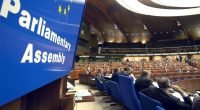The AKP as a party: Is it Islamic, statist or just opportunist?

Date posted: April 6, 2015
The situation is tense these days in Turkey between the ruling Justice and Development Party (AKP) and the Gülen movement.
It’s no exaggeration to say that this fight has transcended any sense of normality; some might even say the ruling party has turned it into a “cultural genocide” of sorts. Of course, if this were a real fight, there would more equal power and leverage on both sides. But the Gülen movement is facing the ruling AKP, which has effectively taken over the entire ruling network. Of course, being a volunteer movement, what the Gülen movement does possess is an “emotional repository” within Turkish society.
In an interview with Zaman, author İsmail Kara, who is known for his books dealing with the topic of Islam, offered up some interpretations of the political andreligious tension that Turkey is experiencing these days. One of the more striking aspects of this interview was his response to the question “How are relationships changing between political leaders and religious groups?” He said: “Let me first make this clear: In our religious as well as cultural memories, religion and the state are not separate. Which is why even when they are placed under pressure by political leaders, religious groups are easily pulled next to political leaders. Many religious groups really do get close to political leaders, hoping to ‘take over the state,’ and see this as legitimate. But actually, quite instinctively, most religious groups know that becoming close to the political leadership will only weaken them. So they are sort of at a dead-end on this front. The same thing goes for the state and the ruling party. The solution herein is not easy. Also, the divisions within the country make things more difficult.”
The various painful situations experienced by many religious groups during the early years of the Turkish Republic wound up imbuing them with missions that were actually not natural for them. The strong, French-style secular pressure imposed by the state during the earliest years of the Turkish Republic pushed not only normal citizens but also members of the intellectual classes into a real search for what their relations with religion were to be. In the meantime, the early-made clarification that the state did not wish to see devout people in the bureaucracy created a significant reflexive reaction and almost allergy among some. And in fact, members of the more privileged classes began to feel the need to sustain their spiritual existence through religious mysticism and the like. Which is why people involved in sects or religious groups who are also part of the state or the bureaucracy have not generally entered into the state as such through any secret plans or strategies. Quite the contrary; most such people are involved in their religious groups or sects as the result of various life problems or personal journeys. In other words, religious groups and sects are not bringing forth people with the express intent of taking over the state. In any case, over time, this all became a natural process. Those people who felt connected to the very same religious beliefs and rituals that the state was busy trying to exclude wound up becoming involved in religious sects and groups and, over time, began to enter into the bureaucracy and the state. Had the state not tried to disrupt the natural balances between religion and society, the idea that “if we don’t stake out places within the state, we will have no chance left to even live in this country” would never have taken root in religious sects and groups. Everything would have just proceeded according to its natural order and balance.
Noted author İsmail Kara also said: “People believe that Ankara is basically just [President Recep] Tayyip Erdoğan. Perhaps we are not really aware of it, but there is the state core.” What we are seeing today in Turkey is not a fight between the Gülen group and the AKP. Erdoğan has, on his road towards single-man rule, either eliminated or forced into submission present or possibly future barriers impeding his journey.
The Gülen group was targeted because, unlike so many other religious sects and groups, it did not obey the word from Ankara. It would be extremely naive to think that as Erdoğan heads down this path, he has not encountered serious problems with at least one section of the iron core of the state. The fight we are witnessing now is a fight between whether Turkey will be more democratic or more authoritarian. The Gülen movement has always developed and carried on its positive relations with democracy. We can only hope that, ultimately, this particular fight helps it realize even more the true benefits of democracy. In the meantime, the AKP places its policies — which are sometimes based on political Islam, other times statism and other times sheer opportunism — out in the open. But never fear; the moment the state’s iron core stops being a network and center for the distribution of wealth to supporters of the ruling party, it will be quickly discarded.
Source: Today's Zaman , April 04, 2015
Tags: Freedoms | Hizmet (Gulen) movement | Hizmet and politics | Turkey |
























